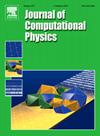具有硬约束的对抗物理信息神经网络用于偏微分方程的最优控制
IF 3.8
2区 物理与天体物理
Q2 COMPUTER SCIENCE, INTERDISCIPLINARY APPLICATIONS
引用次数: 0
摘要
物理信息神经网络(pinn)已经成为解决偏微分方程(PDEs)最优控制问题的一种有前途的深度学习方法。当使用pinn解决pde的最优控制问题时,平衡竞争损失项之间的权衡仍然是一个重大挑战。不同竞争损失项之间的平衡对控制绩效至关重要。生成式对抗网络(GANs)通过引入对抗训练方法来处理不同损失项的权值关系,已被证明可以显著提高pin网络在求解偏微分方程中的准确性。为了解决这一挑战,我们提出了硬约束PINN对抗方法(hPINN-Adver),这是一种将PINN框架与gan相结合的创新方法。该方法旨在“学习损失函数”,通过对抗性训练动态调整不同损失项的权值关系,从而优化竞争损失项之间的平衡。我们进行了详细而全面的实验,将hPINN-Adver与软约束PINN线搜索方法(sPINN-Line)、硬约束PINN线搜索方法(hPINN-Line)、硬约束PINN惩罚方法(hPINN-Penalty)和硬约束PINN增广拉格朗日方法(hPINN-Augmented)进行比较,解决了5个典型且具有代表性的PDEs最优控制问题。大量的数值实验证明了hPINN-Adver方法在求解偏微分方程最优控制问题方面的巨大潜力。本文章由计算机程序翻译,如有差异,请以英文原文为准。
Adversarial physics-informed neural networks with hard constraints for optimal control of PDEs
Physics-informed neural networks (PINNs) have emerged as a promising deep learning approach for solving optimal control problems of partial differential equations (PDEs). Balancing the trade-offs between competing loss terms remains a significant challenge when using PINNs to solve optimal control problems of PDEs. The balance between different competing loss terms is crucial for control performance. Generative adversarial networks (GANs) have been proven to significantly improve the accuracy of PINNs in solving PDEs by introducing adversarial training methods to handle the weight relationships of different loss terms. In order to resolve the challenge, we propose the hard-constrained PINN adversarial method (hPINN-Adver), an innovative approach that integrates the PINN framework with GANs. The method aims to “learn the loss function” and dynamically adjust the weight relationships of different loss terms through adversarial training, thereby optimizing the balance between competing loss terms. We conduct detailed and comprehensive experiments to compare hPINN-Adver with soft-constrained PINN line search method (sPINN-Line), hard-constrained PINN line search method (hPINN-Line), hard-constrained PINN penalty method (hPINN-Penalty) and hard-constrained PINN augmented Lagrangian method (hPINN-Augmented) in solving five typical and representative optimal control problems of PDEs. Extensive numerical experiments demonstrate the great potential of hPINN-Adver method in solving optimal control problems of PDEs.
求助全文
通过发布文献求助,成功后即可免费获取论文全文。
去求助
来源期刊

Journal of Computational Physics
物理-计算机:跨学科应用
CiteScore
7.60
自引率
14.60%
发文量
763
审稿时长
5.8 months
期刊介绍:
Journal of Computational Physics thoroughly treats the computational aspects of physical problems, presenting techniques for the numerical solution of mathematical equations arising in all areas of physics. The journal seeks to emphasize methods that cross disciplinary boundaries.
The Journal of Computational Physics also publishes short notes of 4 pages or less (including figures, tables, and references but excluding title pages). Letters to the Editor commenting on articles already published in this Journal will also be considered. Neither notes nor letters should have an abstract.
 求助内容:
求助内容: 应助结果提醒方式:
应助结果提醒方式:


